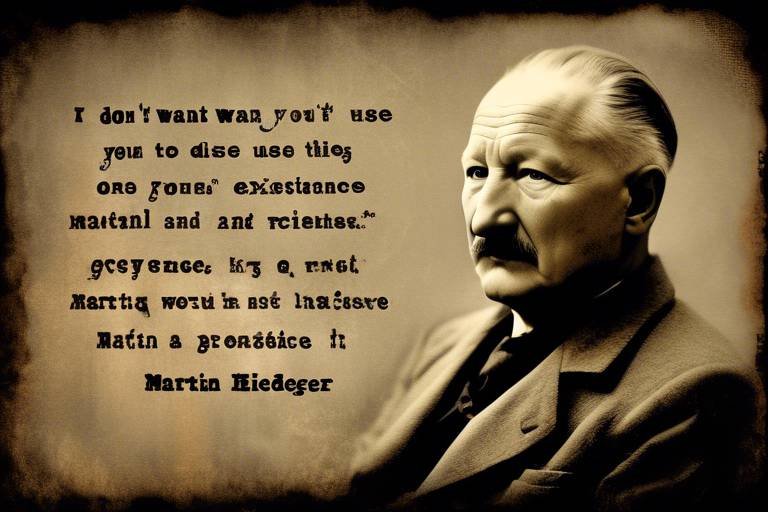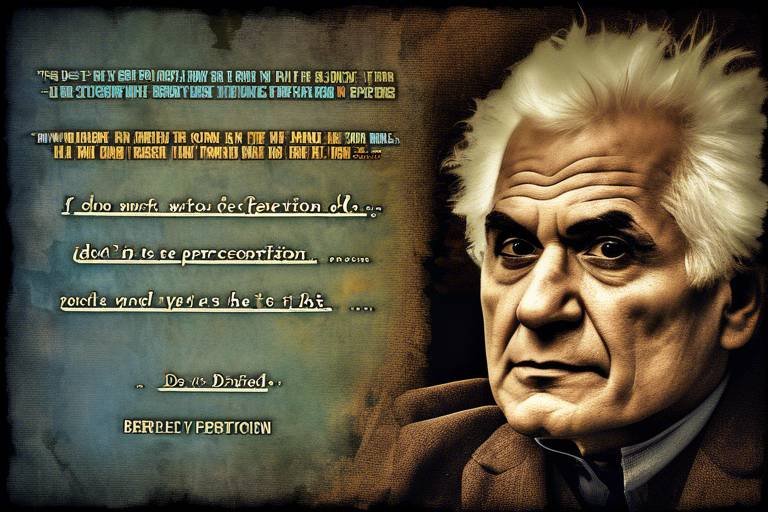Kant's Ethical Philosophy - Understanding the Categorical Imperative
Immanuel Kant, a towering figure in the realm of philosophy, introduced a revolutionary approach to ethics that continues to spark debate and inspire thinkers today. At the heart of his ethical framework lies the Categorical Imperative, a principle that challenges us to consider the morality of our actions beyond mere consequences. But what exactly does this mean? In essence, Kant's philosophy urges us to act according to maxims that can be universally applied, fostering a moral landscape where duty and respect for individuals reign supreme. This article dives deep into Kant’s ethical philosophy, shedding light on the Categorical Imperative and its profound implications for moral reasoning and decision-making.
To truly grasp Kant's ethical philosophy, one must first understand its foundational principles. Kantian ethics is predominantly anchored in the concept of duty and the existence of a moral law that transcends personal inclinations and societal norms. Kant posited that moral actions are not merely about achieving good outcomes; instead, they are about adhering to a set of principles that dictate what is right and wrong. This is where the idea of the moral law becomes crucial. Kant believed that this law is inherent to human reason and that it should guide our decisions, irrespective of the circumstances we find ourselves in. By emphasizing duty over consequence, Kant invites us to adopt a perspective that prioritizes ethical consistency and integrity.
The Categorical Imperative stands as a cornerstone of Kant’s moral philosophy. Unlike hypothetical imperatives, which are conditional and depend on personal desires, the Categorical Imperative is unconditional and universally applicable. It serves as a guide for ethical behavior, demanding that we consider whether the maxims behind our actions could be willed as universal laws. This notion compels us to think critically about our choices and their implications for others. Kant's approach is not merely theoretical; it offers a practical framework for navigating the complexities of moral dilemmas in everyday life.
Kant articulated several formulations of the Categorical Imperative, each offering unique insights into ethical conduct. The first formulation, known as the Formula of Universal Law, proposes that one should only act according to maxims that can be willed as universal laws. This means that before taking action, we should ask ourselves: "Would it be acceptable for everyone to act in this way?" If the answer is no, then the action is deemed immoral.
The second formulation, the Formula of Humanity, emphasizes the intrinsic worth of individuals. It asserts that we must treat people as ends in themselves and never merely as means to an end. This principle is pivotal in respecting human dignity and recognizing the rights of others. By applying these formulations, we can navigate complex moral landscapes with a clearer understanding of our responsibilities towards ourselves and others.
Understanding how the Categorical Imperative applies to real-life ethical dilemmas is crucial. For instance, consider a scenario where you find a wallet on the street. The Categorical Imperative prompts you to reflect on whether returning the wallet could be a universal law. Would it be acceptable for everyone to return lost belongings? The answer is a resounding yes, highlighting the moral obligation to act righteously. In contrast, if you contemplate lying to avoid punishment, the Categorical Imperative would challenge you to consider if such a maxim could be universalized. The implications are clear: honesty must prevail in our decision-making processes.
Kant's ethical philosophy has profoundly influenced contemporary moral theories. His ideas resonate in various fields, from law to human rights, shaping the discourse around ethical behavior. The Categorical Imperative serves as a guiding principle for many modern ethical frameworks, encouraging a focus on duty and respect for individuals. As we navigate the complexities of today’s moral landscape, Kant's insights remind us of the importance of grounding our actions in a robust ethical foundation.
When comparing Kantian ethics to consequentialist theories, the differences become starkly evident. While consequentialism focuses on the outcomes of actions, Kantian ethics emphasizes the intentions behind them. For Kant, the morality of an action is determined by whether it adheres to universal principles, irrespective of the results. This divergence highlights the fundamental philosophical debate between duty-based ethics and outcome-based ethics, inviting us to reflect on what we value more in our moral reasoning.
Kant's contributions to ethics have paved the way for future philosophers, establishing a framework that continues to shape ethical discourse across various fields. His insistence on the importance of reason in moral decision-making has inspired countless discussions and theories. As we explore the complexities of modern ethics, Kant’s legacy serves as a reminder of the enduring power of duty, respect, and moral law in guiding our actions.
- What is the Categorical Imperative?
The Categorical Imperative is a central concept in Kant's ethical philosophy that dictates that one should act only according to maxims that can be universally applied. - How does Kantian ethics differ from consequentialism?
Kantian ethics focuses on the morality of actions based on duty and intentions, while consequentialism evaluates actions based on their outcomes. - Why is the Formula of Humanity important?
The Formula of Humanity emphasizes treating individuals as ends in themselves, which is crucial for respecting human dignity and rights.

The Foundations of Kantian Ethics
Kantian ethics is a robust framework that revolves around the concept of duty and the intrinsic nature of moral law. At its core, Kant believed that true morality is not dictated by the consequences of our actions but rather by the intentions behind them. This brings us to the heart of Kant's philosophy: the idea that moral actions must be performed out of a sense of duty, guided by reason and universal principles. Imagine a world where everyone acts based on their own whims—chaotic, right? Kant sought to establish a more stable moral compass, one that transcends individual desires.
One of the key elements of Kantian ethics is the idea of the categorical imperative. Unlike hypothetical imperatives, which depend on personal desires or goals, the categorical imperative is an unconditional moral law that applies to all rational beings. It demands that we act only according to maxims that can be universally applied. For example, if you think it’s acceptable to lie to get out of a tough situation, ask yourself: would it be okay if everyone did the same? The answer, according to Kant, would be a resounding no. This principle encourages us to think beyond our immediate interests and consider the broader implications of our actions.
Another foundational aspect of Kantian ethics is the emphasis on autonomy. Kant believed that individuals are rational agents capable of making their own decisions. This autonomy is essential for moral responsibility. When we act out of duty, we exercise our rational will, aligning ourselves with universal moral laws. It’s like being the captain of your own ship, navigating through the turbulent waters of ethical dilemmas, with the stars of reason and duty guiding your course.
Furthermore, Kantian ethics posits that moral laws must be respected and upheld, not just for our benefit but for the sake of humanity itself. This leads to a profound respect for human dignity. In Kant’s view, every individual should be treated as an end in themselves, never merely as a means to an end. This principle is crucial in today's society, where ethical considerations often get overshadowed by profit and efficiency. By recognizing the inherent worth of each person, we cultivate a more just and equitable world.
In summary, the foundations of Kantian ethics are built upon the principles of duty, the categorical imperative, autonomy, and respect for human dignity. These elements work together to create a moral framework that not only guides individual behavior but also promotes a more ethical society. As we delve deeper into Kant's philosophy, we will explore how these foundational ideas manifest in the Categorical Imperative and its various formulations.
- What is the Categorical Imperative? The Categorical Imperative is a central concept in Kant's moral philosophy that serves as a universal principle guiding ethical behavior.
- How does Kantian ethics differ from consequentialism? While Kantian ethics focuses on the intention behind actions, consequentialism evaluates the morality of actions based on their outcomes.
- Why is autonomy important in Kantian ethics? Autonomy emphasizes the capacity of individuals to make rational decisions, which is crucial for moral responsibility.

The Categorical Imperative is the cornerstone of Immanuel Kant's moral philosophy, serving as a guiding principle for ethical behavior and decision-making. Unlike hypothetical imperatives, which are conditional and depend on personal desires (like "If you want to be healthy, you should exercise"), the Categorical Imperative is unconditional and universal. It demands that we act according to maxims that can be consistently willed as universal laws. In simpler terms, it asks us to consider whether our actions could be made into a rule that everyone could follow without contradiction.
To grasp the significance of the Categorical Imperative, let's break it down into its key formulations. Kant proposed different ways to understand this imperative, each illuminating a different aspect of ethical behavior. The first formulation, known as the Formula of Universal Law, posits that one should only act according to maxims that could be universally applied. This means that before taking action, one should ask themselves, "What if everyone did this?" If the action leads to a contradiction or an undesirable world, then it cannot be morally justified.
For instance, consider the act of lying. If everyone lied whenever it suited them, trust would erode, and communication would break down. Thus, lying cannot be a universal law, making it ethically impermissible according to Kant. This formulation emphasizes the importance of consistency in moral reasoning, urging us to reflect on the broader implications of our actions.
The second formulation, known as the Formula of Humanity, instructs us to treat individuals as ends in themselves, rather than as mere means to an end. This principle highlights the intrinsic value of human beings and underscores the necessity of respecting their dignity and rights. When we treat someone solely as a means to achieve our goals, we fail to acknowledge their humanity. For example, using a friend merely to gain a favor, without considering their feelings or well-being, violates this ethical principle.
To illustrate the practical application of the Categorical Imperative, consider the dilemma of a whistleblower. When faced with the choice of exposing wrongdoing at their workplace, the whistleblower must evaluate their decision through the lens of the Categorical Imperative. Would the maxim of "exposing wrongdoing is permissible" hold if everyone acted in this manner? If the answer is yes, then the action is morally justified. However, if it leads to chaos or distrust, it may not be permissible.
The Categorical Imperative not only serves as a moral compass but also challenges us to engage in deep ethical reflection. It compels us to consider the implications of our actions on a universal scale, fostering a sense of moral responsibility that transcends personal interests. By adhering to this principle, we cultivate a more just and equitable society, where individuals are respected and moral laws are upheld.
- What is the Categorical Imperative? The Categorical Imperative is a foundational concept in Kant's moral philosophy that dictates that one should act according to maxims that can be universally applied.
- How does the Categorical Imperative differ from hypothetical imperatives? Unlike hypothetical imperatives, which depend on personal desires, the Categorical Imperative is unconditional and applies to everyone, regardless of individual goals.
- Can you provide an example of the Categorical Imperative in action? Yes! If someone considers lying, they should ask themselves if lying could be a universal law. Since it would lead to a breakdown of trust, it is not permissible.
- Why is the Formula of Humanity important? It emphasizes treating individuals with respect and dignity, ensuring that we do not use others merely as tools for our own ends.

The Categorical Imperative is not just a single idea; rather, it is a collection of formulations that guide our moral reasoning. Immanuel Kant, the brilliant mind behind this ethical framework, proposed several ways to articulate this imperative, each shedding light on different aspects of moral duty. At its core, the Categorical Imperative serves as a guide for determining whether an action is morally permissible or not. It challenges us to reflect on the universality of our actions and the inherent dignity of individuals.
One of the most significant formulations is the **Formula of Universal Law**. This principle states that one should act only according to that maxim which one can at the same time will that it should become a universal law. In simpler terms, before you make a choice, ask yourself: "What if everyone did this?" If the action can be willed universally without contradiction, then it is morally acceptable. For example, consider lying. If lying were a universal law, trust would erode, and communication would break down. Thus, lying fails this test of universality, making it morally wrong.
Another key formulation is the **Formula of Humanity**, which emphasizes the importance of treating individuals as ends in themselves, and never merely as means to an end. This principle is crucial because it highlights the respect and dignity owed to every person. When we use others solely for our benefit, we dehumanize them and violate this moral law. For instance, think about a situation where someone is exploited for their labor. This exploitation treats the individual as a mere tool for achieving a goal, disregarding their inherent worth. Kant's emphasis on humanity urges us to recognize the value of every individual and to act in ways that respect their autonomy and rights.
To further clarify these formulations, let’s summarize them in the following table:
| Formulation | Description |
|---|---|
| Formula of Universal Law | Act only according to that maxim which can be willed as a universal law. |
| Formula of Humanity | Treat humanity, in yourself and others, always as an end and never merely as a means. |
In essence, these formulations serve as a moral compass, helping us navigate the complexities of ethical decision-making. They compel us to consider not only the consequences of our actions but also the principles that underlie our choices. When faced with a moral dilemma, reflecting on these formulations can provide clarity and guidance, ensuring that our actions align with a higher moral standard.
Ultimately, understanding these formulations of the Categorical Imperative is essential for anyone interested in moral philosophy. They encourage us to think critically about our actions and their implications, fostering a deeper appreciation for the ethical dimensions of our lives. So, the next time you find yourself at a moral crossroads, remember Kant’s wisdom: act in a way that could be universalized and always treat others with the respect they deserve.
- What is the Categorical Imperative? The Categorical Imperative is a central concept in Kant's ethical philosophy, serving as a universal moral law that guides our actions.
- How does the Formula of Universal Law work? It requires individuals to consider whether their actions could be acceptable if everyone acted the same way.
- What does the Formula of Humanity emphasize? It emphasizes treating individuals as ends in themselves, respecting their dignity and autonomy.
- Can the Categorical Imperative be applied to modern ethical dilemmas? Yes, it provides a framework for evaluating the morality of contemporary issues by considering universalizability and respect for individuals.

The Formula of Universal Law is one of the most significant aspects of Immanuel Kant's ethical framework. At its core, this formulation emphasizes that we should act only according to those maxims that we can will to become universal laws. In simpler terms, before making a decision, we should ask ourselves, "Would I want everyone to act this way?" If the answer is yes, then the action is morally permissible; if no, then it is not. This guideline serves as a litmus test for ethical behavior, ensuring that our actions are not just beneficial to ourselves but also to others.
Imagine a world where everyone follows this principle. It would be a society where honesty, respect, and fairness reign supreme. For instance, consider the act of lying. If everyone lied whenever it suited them, trust would erode, and society would crumble. Therefore, the maxim "It is acceptable to lie to get what you want" fails the universalization test because it cannot be willed as a universal law without leading to chaos.
Moreover, the Formula of Universal Law has profound implications for moral actions. It encourages individuals to rise above personal interests and consider the broader impact of their decisions. This principle is not just about legality but also about morality, pushing us to think critically about our choices. When we reflect on our actions through this lens, we begin to understand the interconnectedness of human behavior. Each decision we make can ripple through society, affecting others in ways we may not immediately see.
To illustrate the significance of this formulation, let’s consider a few scenarios:
- Scenario 1: A student is tempted to cheat on an exam. If this action were universalized, it would mean that cheating is acceptable. Consequently, the value of the exam would diminish, harming the educational system.
- Scenario 2: A person finds a lost wallet and considers keeping the money. If everyone acted on this maxim, the concept of ownership would be undermined, leading to a breakdown of trust in society.
- Scenario 3: A company decides to pollute the environment for profit. If this were universalized, it would create a world where environmental degradation is the norm, jeopardizing future generations.
These examples highlight how the Formula of Universal Law prompts us to evaluate the broader implications of our actions. By adhering to this principle, we not only align our behavior with ethical standards but also contribute to a more just and equitable world. In essence, Kant's formulation serves as a guiding star for moral reasoning, urging us to act with integrity and respect for others.

The Formula of Humanity is one of the most profound aspects of Immanuel Kant's ethical philosophy. At its core, this formulation asserts that we must treat every individual as an end in themselves, rather than merely as a means to achieve our own goals. This principle is not just a guideline; it's a moral imperative that encourages us to recognize the intrinsic value of every person. When we think about it, this idea resonates deeply with our everyday interactions. Have you ever felt used or undervalued? That feeling stems from a violation of this fundamental principle of respect and dignity.
Kant believed that every human being possesses inherent worth, which must be honored in all circumstances. This perspective shifts the focus of ethical behavior from outcomes to the treatment of individuals. In a world where utilitarianism often dominates discussions about morality—where the ends justify the means—Kant's Formula of Humanity serves as a crucial reminder that our actions should always respect the autonomy and dignity of others. It compels us to ask ourselves: Are we treating others with the respect they deserve, or are we simply using them to satisfy our own desires?
To further illustrate the significance of the Formula of Humanity, consider the implications of this principle in various contexts. For example:
- In the Workplace: Treating colleagues not just as resources but as individuals with their own goals and aspirations fosters a healthier work environment.
- In Relationships: Recognizing that a partner is not merely a source of happiness but a person with their own needs and desires can lead to deeper, more meaningful connections.
- In Society: Upholding the rights of every individual is essential for a just and equitable community, where everyone is valued.
Moreover, the Formula of Humanity challenges us to reflect on our societal norms and practices. Are we, as a society, upholding the dignity of every individual? This question is crucial, especially in discussions about human rights and social justice. When we advocate for policies or engage in practices that dehumanize others, we violate this fundamental ethical principle. Kant's formulation pushes us to critically assess our actions and their moral implications.
In conclusion, the Formula of Humanity is not just a theoretical concept; it is a call to action. It urges us to engage with the world in a way that acknowledges and respects the humanity of others. By embracing this principle, we can contribute to a more compassionate and ethical society, where every individual is valued not just for what they can do, but for who they are. As we navigate our daily lives, let us remember that every interaction holds the potential to affirm or undermine the dignity of those around us. The choice is ours, and it is a powerful one.
- What is the Formula of Humanity? The Formula of Humanity is a principle in Kant's ethical philosophy that emphasizes treating individuals as ends in themselves, not merely as means to an end.
- Why is the Formula of Humanity important? This principle is crucial because it underlines the inherent dignity and worth of every person, guiding ethical behavior in personal and societal contexts.
- How does the Formula of Humanity apply in modern society? It encourages individuals and organizations to respect human rights, promote equality, and foster meaningful relationships based on mutual respect.

The Categorical Imperative serves as a cornerstone in Kant's ethical framework, guiding individuals through the murky waters of moral dilemmas. But how exactly does it apply to our everyday lives? Imagine you're faced with a tough decision—do you tell a white lie to spare someone's feelings, or do you stick to the truth at all costs? This is where the Categorical Imperative comes into play, providing a clear lens through which to view our actions.
One of the most impactful applications of the Categorical Imperative is its ability to promote consistency in moral reasoning. For instance, if you consider lying to a friend acceptable in one situation, you must also accept that lying could be permissible in any situation. This idea is encapsulated in the Formula of Universal Law, which urges individuals to act only according to maxims that could be willed as universal laws. In simpler terms, if everyone lied when it was convenient, trust would erode, and the fabric of society would unravel. Thus, the Categorical Imperative challenges us to think beyond our immediate desires and consider the broader implications of our actions.
Moreover, the Categorical Imperative emphasizes the intrinsic value of humanity. Through the Formula of Humanity, we are reminded to treat others as ends in themselves, not merely as means to our own ends. This principle can significantly impact how we interact in both personal and professional relationships. For example, consider a business scenario where profit is prioritized over employee welfare. If a company uses its employees merely as tools for financial gain, it contradicts the very essence of the Categorical Imperative. Respecting individuals as autonomous agents leads to a more ethical and sustainable approach to business practices.
Let's take a look at some real-world scenarios where the Categorical Imperative can guide ethical decision-making:
| Scenario | Application of Categorical Imperative |
|---|---|
| Honesty in Friendships | Should I tell my friend the truth about their poor performance? If I lie, can I universalize this action without harming trust? |
| Environmental Responsibility | Should I recycle? If everyone acted as if recycling was optional, what would happen to our planet? |
| Workplace Ethics | Is it acceptable to take credit for a colleague's work? Would this be a behavior I would want to see universally accepted? |
By analyzing these scenarios through the lens of the Categorical Imperative, we can arrive at more principled decisions that respect both our own dignity and that of others. The beauty of Kant's philosophy lies in its straightforwardness; it provides a clear method for evaluating our actions. Instead of getting lost in the complexities of outcomes, we can focus on the intentions behind our actions. This clarity is especially crucial in an age where ethical dilemmas seem to multiply daily.
In conclusion, the Categorical Imperative is not just a theoretical concept confined to the pages of philosophy books; it is a practical tool for navigating the ethical challenges we face in our everyday lives. Whether it's a simple decision about honesty or a complex issue involving social responsibility, Kant's framework encourages us to act with integrity and respect for others. So, the next time you find yourself at a moral crossroads, remember to ask: Can I will that my action become a universal law?
- What is the Categorical Imperative? The Categorical Imperative is a central concept in Kant's ethical philosophy that dictates that one should act only according to maxims that could be willed as universal laws.
- How does the Categorical Imperative apply to everyday decisions? It provides a framework for evaluating the morality of actions by considering whether they could be universally applied without contradiction.
- What are the main formulations of the Categorical Imperative? The two main formulations are the Formula of Universal Law and the Formula of Humanity, each emphasizing different aspects of moral duty.

Immanuel Kant's ethical philosophy has left an indelible mark on the landscape of modern ethics. His ideas challenge us to think critically about morality and the principles that guide our decisions. Kant's emphasis on duty and moral law invites individuals to consider not just the outcomes of their actions, but the intentions and principles behind them. This fundamental shift has shaped contemporary moral theories, encouraging a more profound exploration of what it means to act ethically.
One of the most significant impacts of Kant's philosophy is the way it has influenced current discussions surrounding human rights. By asserting that individuals should be treated as ends in themselves, Kant laid the groundwork for the modern human rights movement. This perspective emphasizes the inherent dignity of every person, advocating for respect and equality. Today, when we discuss issues like social justice, equality, and individual rights, we are echoing Kantian principles that demand we prioritize human dignity over utilitarian calculations.
Moreover, Kant's ethical framework has sparked debates among philosophers and ethicists regarding the nature of morality. His categorical imperative serves as a litmus test for ethical behavior, prompting us to question whether our actions could be universalized as a moral law. This inquiry leads to a more rigorous examination of our motivations and the societal implications of our choices. As a result, Kant's ideas continue to resonate in discussions about ethical frameworks in various fields, from law to medicine, and even in business ethics.
To illustrate Kant's influence, consider the following table that compares Kantian ethics with other ethical theories:
| Theory | Key Principle | Focus |
|---|---|---|
| Kantian Ethics | Categorical Imperative | Intentions and moral duties |
| Utilitarianism | Greatest Happiness Principle | Consequences of actions |
| Virtue Ethics | Character and virtues | Moral character |
This comparison highlights how Kant's focus on intentions sets him apart from consequentialist theories like utilitarianism, which prioritize outcomes over moral duties. This divergence is crucial in understanding the broader implications of ethical decision-making in today's complex world.
Additionally, Kant's influence extends beyond theoretical discussions; it has practical applications in various domains. For instance, in medical ethics, the principle of informed consent aligns with Kantian ethics, as it respects the autonomy and dignity of patients. Similarly, in business ethics, companies are increasingly adopting policies that reflect Kantian principles, emphasizing ethical standards that prioritize stakeholder rights and responsibilities over mere profit maximization.
In summary, Kant's ethical philosophy continues to shape modern ethical discourse, challenging us to consider the moral implications of our actions. His teachings encourage a deeper understanding of duty, respect for individuals, and the importance of moral intentions. As we navigate the complexities of contemporary ethical dilemmas, Kant's legacy serves as a guiding light, reminding us that ethics is not just about the ends we pursue but also the means we employ to achieve them.
- What is the Categorical Imperative? The Categorical Imperative is a central concept in Kant's moral philosophy, which states that one should act only according to maxims that can be willed as universal laws.
- How does Kant's philosophy apply to modern ethics? Kant's emphasis on duty and respect for individuals has influenced contemporary discussions on human rights, medical ethics, and corporate responsibility.
- What distinguishes Kantian ethics from other ethical theories? Unlike consequentialist theories that focus on the outcomes of actions, Kantian ethics prioritizes the intentions behind actions and the adherence to moral duties.

When we dive into the realm of ethics, we encounter two major philosophical approaches: Kantian ethics and consequentialism. At first glance, these two frameworks might seem like two sides of the same coin, but they are, in fact, fundamentally different in their principles and applications. Kant's ethical philosophy is rooted in the idea of duty and adherence to moral laws, while consequentialism focuses primarily on the outcomes of actions.
To better understand the differences, let’s break them down into their core components. Kantian ethics is based on the Categorical Imperative, which dictates that actions must be universally applicable and respect the inherent dignity of all individuals. In contrast, consequentialism, particularly in its most popular form known as utilitarianism, posits that the rightness or wrongness of an action is determined solely by its consequences. This means that an action can be deemed ethical if it leads to the greatest good for the greatest number, regardless of the intentions behind it.
Consider this analogy: Imagine you’re at a crossroads, and you have two paths to choose from. One path represents Kantian ethics, where you must consider the moral law and whether your action could be universally accepted as a law for everyone. The other path is consequentialism, where you weigh the potential outcomes of your actions to determine which choice maximizes happiness. This metaphor highlights how Kantian ethics emphasizes intention and duty, while consequentialism prioritizes results.
Let's illustrate these differences further in the table below:
| Aspect | Kantian Ethics | Consequentialism |
|---|---|---|
| Focus | Intentions and adherence to moral duty | Outcomes and overall happiness |
| Moral Law | Universal and absolute | Variable and context-dependent |
| Example | Lying is wrong, regardless of the outcome | Lying may be acceptable if it leads to a better outcome |
As we can see, the stark contrast between these two ethical theories raises intriguing questions about morality. For instance, can an action that results in happiness be justified if it violates a moral duty? This is a point of contention between the two philosophies. Kant would argue that the morality of an action is not contingent upon its outcome, while consequentialists would assert that the end justifies the means.
In practical terms, this divergence can lead to vastly different conclusions in ethical dilemmas. For example, in a situation where telling a lie could save a life, a Kantian would maintain that lying is inherently wrong, regardless of the outcome. On the other hand, a consequentialist might argue that the moral choice is to lie, as it results in a greater good. This fundamental difference in approach not only shapes individual moral reasoning but also influences broader societal norms and legal frameworks.
In conclusion, the debate between Kantian ethics and consequentialism is ongoing and complex. While both approaches offer valuable insights into moral decision-making, they ultimately lead to different conclusions about what constitutes ethical behavior. Understanding these differences is crucial for anyone looking to navigate the intricate landscape of moral philosophy.
- What is the main difference between Kantian ethics and consequentialism?
Kantian ethics focuses on the intentions behind actions, while consequentialism evaluates the outcomes of those actions. - Can an action be considered moral in one framework but not in another?
Yes, an action can be viewed as ethical from a consequentialist perspective but deemed immoral by Kantian standards. - How do these ethical theories apply in real-life situations?
They guide individuals and societies in making moral decisions, influencing laws, and shaping cultural norms.

Immanuel Kant's ethical philosophy has left an indelible mark on the landscape of moral philosophy, shaping the way we think about ethics even today. His emphasis on duty, moral law, and the intrinsic worth of individuals has influenced a myriad of thinkers and movements. Kant’s ideas challenge us to consider not just the outcomes of our actions but the principles that guide them. This is a fundamental shift from previous ethical frameworks, which often prioritized consequences over intentions.
One of the most significant aspects of Kant's legacy is the establishment of a framework that prioritizes rationality and autonomy. By asserting that moral agents are capable of making rational decisions based on universal principles, Kant empowers individuals to take responsibility for their actions. This notion of autonomy is crucial in contemporary discussions about human rights and ethical treatment, as it underscores the belief that every person deserves respect and dignity.
Moreover, Kant's ideas have inspired various ethical theories that build upon his foundational principles. For instance, deontological ethics, which focuses on the morality of actions themselves rather than their consequences, can trace its roots back to Kant. This approach has sparked debates and discussions among modern philosophers, leading to the development of new ethical frameworks that continue to resonate in fields like law, politics, and bioethics.
To illustrate Kant's enduring influence, consider the following table that outlines some key areas impacted by his philosophy:
| Area of Impact | Key Contributions |
|---|---|
| Human Rights | Kant's emphasis on treating individuals as ends in themselves laid the groundwork for modern human rights theories. |
| Legal Theory | His principles have influenced legal frameworks that prioritize justice and moral duty over mere legalistic interpretations. |
| Bioethics | Kantian ethics informs debates on medical ethics, emphasizing the importance of consent and the dignity of patients. |
| Environmental Ethics | His ideas are being revisited to address moral responsibilities towards the environment and future generations. |
Furthermore, Kant's thoughts on the moral imperative have encouraged philosophers to explore the implications of ethical decision-making in various contexts. His insistence on universalizability—the idea that one should act in a way that their actions could be a universal law—challenges us to think critically about our moral choices. This principle has been particularly relevant in discussions surrounding global issues such as climate change, social justice, and economic inequality.
In conclusion, Kant's legacy in ethical thought is not just a historical artifact; it is a living framework that continues to provoke thought and inspire action. As we grapple with complex moral dilemmas in our modern world, Kant’s philosophy offers a robust foundation for navigating the intricacies of ethical decision-making. Whether in personal relationships, professional conduct, or societal responsibilities, Kant reminds us that our actions must align with our principles, urging us to act with integrity and respect for all individuals.
- What is the Categorical Imperative? The Categorical Imperative is a central concept in Kant's ethics, stating that one should act only according to maxims that can be universally applied.
- How does Kant's philosophy influence modern ethics? Kant's emphasis on duty and moral law has shaped contemporary discussions on human rights, legal theory, and bioethics.
- What is the difference between Kantian ethics and consequentialism? Kantian ethics focuses on the morality of actions themselves, while consequentialism evaluates the outcomes of actions.
- Why is autonomy important in Kant's philosophy? Autonomy is crucial as it empowers individuals to make rational decisions based on universal moral principles, promoting respect and dignity.
Frequently Asked Questions
- What is the Categorical Imperative?
The Categorical Imperative is a central concept in Kant's ethical philosophy. It serves as a universal moral law that dictates how individuals should act. Essentially, it requires that your actions could be made into a universal law applicable to everyone, ensuring that your decisions are grounded in ethical reasoning rather than personal gain.
- How does the Categorical Imperative guide ethical behavior?
The Categorical Imperative guides ethical behavior by providing a framework that emphasizes duty and moral law. It asks individuals to consider whether their actions could be universally applied. If not, then the action is deemed unethical. This approach encourages consistent moral reasoning and respects the dignity of all individuals.
- What are the different formulations of the Categorical Imperative?
Kant proposed several formulations of the Categorical Imperative, each highlighting different aspects of moral reasoning. The two most notable are the Formula of Universal Law, which focuses on the universality of actions, and the Formula of Humanity, which emphasizes treating individuals as ends in themselves, not merely as means to an end. Together, these formulations provide a comprehensive understanding of Kantian ethics.
- Can you give an example of the Categorical Imperative in action?
Sure! Imagine you're considering whether to lie to get out of a difficult situation. Using the Categorical Imperative, you would ask yourself if lying could be a universal law. If everyone lied in similar situations, trust would erode, making communication impossible. Hence, lying fails the test of universality and is deemed unethical according to Kant's philosophy.
- How does Kant's ethics differ from consequentialism?
Kant's ethics is fundamentally different from consequentialism, which evaluates the morality of actions based on their outcomes. While consequentialists focus on the results of actions, Kantian ethics emphasizes the intention behind actions and adherence to moral duty. This means that, in Kant's view, the rightness of an action is not determined by its consequences but by whether it aligns with moral law.
- What is Kant's legacy in modern ethics?
Kant's legacy in modern ethics is profound. His emphasis on duty, moral law, and human dignity has influenced a wide array of contemporary ethical theories. Many modern philosophers draw on his ideas to discuss rights, autonomy, and moral obligations, showcasing how his thoughts continue to resonate in today's ethical discourse.



















